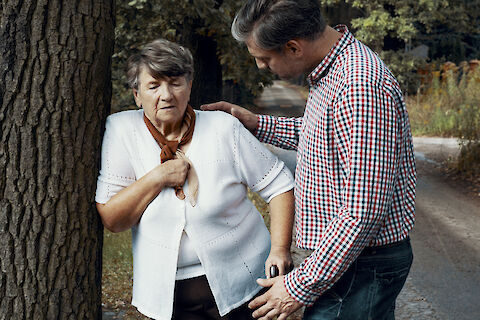
Recognized as American Heart Month, February is a significant month for heart health awareness. This article discusses a health issue of particular importance to seniors: heart attacks. Often, heart attack symptoms in seniors are not as stark or immediate as those often portrayed in popular media. Subtle symptoms easily go undetected and are sometimes mistaken for general signs of aging. As a result, many seniors and their caregivers may not recognize these symptoms when they occur. This lack of awareness can delay crucial medical interventions, which may severely impact the prognosis and recovery. We will review subtle signs to help caregivers and seniors identify potential heart attacks and seek immediate attention.
Understanding Heart Attacks
A heart attack, medically known as a myocardial infarction, occurs when blood flow to a part of the heart is blocked, often by a blood clot. This blockage can cause damage or death to part of the heart muscle. Seniors, particularly those with certain risk factors such as high blood pressure, diabetes, and high cholesterol, are often more susceptible to heart attacks. However, unlike the dramatic chest-clutching moments depicted in movies and television, older adults may display more subtle signs during a heart attack.
The Subtle Signs of Heart Attacks in Seniors
Subtle heart attack symptoms can sometimes mimic normal aging processes:
- For example, you might mistake unusual fatigue or weakness for the typical tiredness seniors might feel after a busy day. However, when these symptoms occur without a clear cause or are accompanied by other symptoms, they can signal a heart attack.
- Shortness of breath or difficulty breathing can also indicate a heart attack. Seniors may dismiss this symptom as a normal part of aging or attribute it to non-cardiac conditions like respiratory diseases. However, when it occurs without exertion or continues at rest, it could indicate a heart problem.
- Occasionally, seniors may experience odd aches and pains in the back, stomach, or arm. These atypical pain sites can mistakenly be associated with arthritis or other common senior health issues rather than heart-related problems.
- Seniors may encounter digestive issues like indigestion, nausea, or vomiting that don't respond to regular treatments.
- Seniors with heart problems may also experience sleep disturbances.
- Excessive sweating without an apparent reason could point to a heart attack.
- Some heart attack victims experience sudden dizziness and unexplained anxiety or restlessness.
All these subtle signs could point to a potential heart attack.
The Importance of Immediate Treatment
Identifying these subtle signs early and seeking immediate treatment is critical as it can significantly increase survival rates and reduce damage to the heart. Delaying treatment may lead to more serious consequences, including severe heart damage and life-threatening complications.
How to Respond to Potential Heart Attack Symptoms
If you suspect that a senior is having a heart attack based on these subtle signs, seek immediate medical attention. While waiting for help, try to keep the person calm and comfortable. Don't underestimate the importance of prevention. Regular medical check-ups can help detect and manage heart risks before escalating.
We Can Help
Recognizing the subtle signs of heart attacks in seniors is crucial. It's important to notice these symptoms, which can lead to severe complications if addressed promptly. At Senior Helpers Webster Groves, we support seniors and their caregivers in St. Louis City, Webster Groves, Frontenac, Crestwood, and Oakville. Contact us today for assistance with senior care, and let us help ensure the heart health of your loved ones. We would love to discuss our services for seniors and their caregivers, such as Chronic Disease Care and Personal Care.